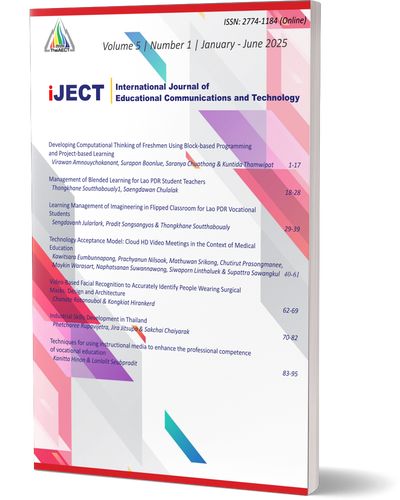Development of a Challenge based Learning Platform to Enhance Artificial Intelligence Competencies for Vocational Education Students
Abstract
Thailand's education system, in general, Vocational education is an aspect of Thailand's educational pathway that aims to practice vocational skills, which plays an important role in driving the development of technical skills. In recent years, the rapid development of artificial intelligence technologies has raised a significant challenge for vocational students regarding knowledge development and technology adoption. To strengthen the artificial intelligence competencies of vocational students, this research proposed a learning platform for vocational students and studied the suitability and competency from the following objectives: (1) Study the synthesize the challenging-based learning process of vocational students. (2) Develop a challenging-based learning platform to strengthen vocational students' competency in artificial intelligence technology with experts from various institutions in the design, development, teaching, and learning process. (3) Study the suitability of the development of a challenging-based learning platform to enhance the AI competencies of vocational students. The assessment of the platform consists of (1) A challenging learning platform architecture to enhance the competency of artificial intelligence of vocational students and (2) A suitability assessment of the development of a challenging-based learning platform to strengthen the artificial intelligence competencies of vocational students. The results show significant suitability of the learning process and procedures and appropriateness of the development of a challenging-based learning platform to enhance the AI competencies of vocational students.
References
Apple. (2011). Challenge Based Learning A Classroom Guide. Education. https://www.apple.com/br/education/docs/CBL_Classroom_Guide_Jan_2011.pdf
Bankins, S., Hu, H., & Yuan, Y. (2024) Artificial intelligence, workers, and future of work skills. Current Opinion in Psychology, 58, 1-6. https://doi.org/10.1016/j.copsyc.2024.101828
Chomjit, K., & Patthamasopasakul, R. (2025). Factors affecting the use of artificial intelligence for learning of students in private vocational colleges. Journal of Social Science and Cultural, 9(2), 380-393. https://so06.tci-thaijo.org/index.php/JSC/article/view/280662
Doulougeri, K., Vermunt, J. D., Bombaerts, G., & Bots, M. (2024) Challenge-based learning implementation in engineering education: A systematic literature review. Journal of Engineering Education, 113(4), 1076-1106. https://doi.org/10.1002/jee.20588
Gallagher, S. E., & Savage, T. (2020). Challenge-based learning in higher education: an exploratory literature review. Teaching in Higher Education, 28(6), 1135-1157. https://doi.org/10.1080/13562517.2020.1863354
Gholami, M., Changaee, F., Karami, K., Shahsavaripour, Z., Veiskaramian, A., & Birjandi, M., (2021). Effects of multiepisode case-based learning (CBL) on problem-solving ability and learning motivation of nursing students in an emergency care course. Journal of Professional Nursing, 37(3), 612-619. https://doi.org/10.1016/j.profnurs.2021.02.010
Gkinko, L., & Elbanna, A. (2023). The appropriation of conversational AI in the workplace: A taxonomy of AI chatbot users. International Journal of Information Management, 69, 1-11. https://doi.org/10.1016/j.ijinfomgt.2022.102568
Jean-Baptiste B. (2020). Top 8 digital transformation trends in education. https://hospitalityinsights.ehl.edu/digital-transformation-trends
Johnson, L.F., Smith, R.S., Smythe, J.T. & Varon, R.K. (2009). Challenge-Based Learning: An Approach for Our Time. Austin, Texas: The New Media Consortium. https://www.learntechlib.org/p/182083/
Marin, C., Hargis, J., & Cavanaugh, C. (2013). iPad learning ecosystem: Developing challenge-based learning using design thinking. Turkish Online Journal of Distance Education. 14. 22-34. https://www.researchgate.net/publication/287835199
Nichols, M., Cator, K., & Torres, M. (2016). Challenge Based Learner User Guide. Redwood City, CA: Digital Promise. https://www.researchgate.net/publication/337029776_Challenge_Based_Learning_Guide
Nilsook, P., Chatwattana, P., & Seechaliao, T. (2021). The Project-based Learning Management Process for Vocational and Technical Education. Higher Education Studies, 11(2), 20. https://doi.org/10.5539/hes.v11n2p20
Office of the Vocational Education Commission. (2019). Vocational Education Management Criteria and Guidelines Level Vocational Certificate and Advanced Vocational Certificate: Vocational Education Management. Ministry of Vocational Education. https://vec.go.th/AboutVEC/ManagementofVocationalEducation.aspx
Pepin, B. E. U., & Kock, Z.-J. D. Q. P. (2021). Students’ use of resources in a challenge-based learning context involving mathematics. International Journal of Research in Undergraduate Mathematics Education, 7(2), 306-327. https://doi.org/10.1007/s40753-021-00136-x
Premsmith, J., Wannapiroon, P., & Nilsook, P. (2016). System Design of Challenge-Based Learning Management System. The Fourth International Conference on Technical Education. 27-33. https://doi.org/10.14416/c.fte.2016.11.062
Qu, X., Wang, J., & Miao, R. (2021). Application of Wearable Technology in Education. Open Access Library Journal, 8(11), https://doi.org/10.4236/oalib.1107630
Rujira, T., Nilsook, P., & Wannapiroon, P. (2020). Synthesis of Vocational Education College Transformation Process toward High-Performance Digital Organization. Int. J. Inf. Educ. Technol, 10. 832-837. https://doi.org/10.18178/ijiet.2020.10.11.1466
Su, J., & Yang, W. (2023). Artificial Intelligence (AI) literacy in early childhood education: an intervention study in Hong Kong. Interactive Learning Environments, 4, 1-14. https://doi.org/10.1016/j.caeai.2023.100124
Van den Beemt, A., Van de Watering, G., & Bots, M. (2022). Conceptualising variety in challenge-based learning in higher education: the CBL-compass. European Journal of Engineering Education, 48(1), 24-41. https://doi.org/10.1080/03043797.2022.2078181
Downloads
Published
How to Cite
Issue
Section
License
Copyright (c) 2025 International Journal of Educational Communications and Technology

This work is licensed under a Creative Commons Attribution-NonCommercial-NoDerivatives 4.0 International License.







